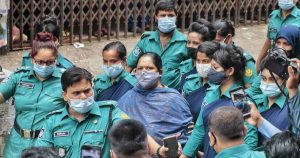AHM. Bazlur Rahman
As part of addressing the risk of Cyclone ROANU, eight community radio (CR) stations in the coastal region of Bangladesh broadcast 348 hours program for 3 days continuously from May 19 to May 21, 2016
The Community Radio stations broadcast and served on 24-hours basis to keep alert the community during and after the cyclone Rohnau hit in the coastal belt of the country. There are eight community radio stations situated in the coastal region that played a big role in saving people’s lives and assets.Following the cyclone warning signals the stations started broadcasting from 19 May afternoon and continued non-stop till midnight of 21st May. During the time they have broadcasted 348 hours, of those 187 hours are fully around the message and information on cyclone-Roanu, the disaster, it’s after-effects and what should be done for the community.
The CR stations continuously broadcast the updates by increasing their previous air-time in line with the “Standing Orders on Disaster (SOD) of Government of the People’s Republic of Bangladesh”.
The stations collected updated information from Meteorological Department, the disaster cells and local control room set up by the District and Upazila administrative authority. As there was no electricity in the area during the time, they were to depend fully on the generator and keep the broadcasting service un-interrupted.
The community radio stations maintained full-time liaison with the disaster monitoring cells at district and Upazila administration. They also kept contact and collected updated information from the Red Cresent volunteers and the scouts who were working hard with the disaster-prone community.Along with broadcasting message and PSAs received from the local government authority, they also broadcasted their own programs which they have learned and produced through training and their experiences from previous disasters.
With broadcasting of weather news bulletin after every 10-15 minutes, they also broadcasted magazine program, drama, feature, interview and talk show of the responsible persons involved in disaster management in the area. As an offline support group, the members of the radio listeners clubs also took part in the process of fulfilling the objective of the station. They visited the house-to-house of the listeners and disseminated information on the latest situation of the cyclone, their contact points during an emergency, what types of services available for them during rescue or rehabilitation community. At the same time, they also supplied information to the radio stations and kept them updated about the community situation.
Eight radio stations are Community Radio Nalta 99.2 ( Kaligonj, Satkhira), Community Radio Sundarban 98.8 ((Koyra, Khulna), Community Lokobetar 99.2 (Barguna Sadar), Community Rural Radio Krishi Radio 98.8 (Amtoli, Barguna), Community Radio Naf 99.2 (Teknaf, Cox’s Bazar), Community Radio Sagargiri 99.2 (Sitakunda, Chittagong), Community Radio Meghna 99.00 (Charfasion, Bhola) and Community Radio Sagardwip 99.2 (Hatiya, Noakhali).
Broadcasting continued even at power failure/load shedding, by using alternative power supplies through generators. Since the stormy weather caused power disruption all over, Community Radio stations became the only source of information to the local people so that they could know all the details related to the cyclone and how to take precautionary measures to address their safety. This saved many lives and assets, and thus proved the essential role of Community Radio stations at a grassroots level in our coastal region.
A total of 116 Community broadcasters (Female 37, Male 79) and volunteers and members from 175 listeners clubs worked throughout the whole service. The broadcasters continued broadcasting service on shifting basis.
It can be mentioned that Bangladesh NGOs Network for Radio and Communication (BNNRC) with support from Free Press Unlimited has supported the radio stations during the times of cyclone Mahasen and Komen and thus helped to save the lives and assets of millions of the coastal region. BNNRC kept constant coordination with those stations and provided information and guidance in the whole process.
(AHM. Bazlur Rahman is the Chief Executive Officer of Bangladesh NGOs Network for Radio and Communication (BNNRC)




